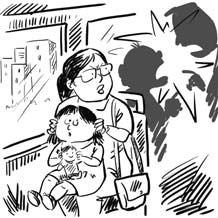Time for anti-cursing campaign
By Zou Hanru (China Daily)Updated: 2007-06-15 06:54
 Should a person speaking foul language inside Hong Kong's
train system be sent to jail? The question recently triggered a debate.
Should a person speaking foul language inside Hong Kong's
train system be sent to jail? The question recently triggered a debate.
The issue arose from a proposed legal provision that prohibited the use of abusive language on the premises of the new railway company to be formed by the merger of the two existing ones - Mass Transit Railway Corporation (MTRC) and the Kowloon-Canton Railway Corporation (KCRC). The enactment of a new set of laws governing the new company is necessary before the merger.
During the legislative process, it was proposed that those caught speaking
abusively on railway premises and found guilty in court should be sentenced to
jail for as long as six months in addition to a fine of HK$5,000 ($640). 
There was strong opposition to this proposal as some thought the penalty was too harsh and such a law would be difficult to enforce. Eventually the jail term proposal was dropped and the amount of the fine reduced.
As a matter of fact, tourists and many local residents are unaware that swearing is already prohibited in some public areas in Hong Kong, such as the airport.
Those who disagree with the punishment argue that civic education is the best way to correct people's indecent behavior.
Mainland authorities seem to agree as they have launched public education campaigns to ensure that Beijingers behave themselves during the 2008 Olympic Games. Among these campaigns is one that advocates the cleaning up of the language of the capital's residents.
While the legal drive in Hong Kong was necessitated by the rail merger, the mainland campaigns are meant to rebuild the image for a nation which used to be called "the land of propriety".
Beijingers are known, among other things, for their readiness to hurl abuse at each other. Shouting obscenities is so common during sports events that the term "national swearing" has come into existence.
However, the civic education campaign that has begun in the capital does not imply that Beijing residents particularly lack decorum compared with their fellow countrymen.
As the nation prepares to host the world's biggest sports extravaganza, Beijing residents are expected to demonstrate to the world that the Chinese are a people of civility.
Many centuries ago people from around Asia came to China to pay tribute to the emperor and to admire and learn from Chinese culture. How can today's descendants of the dragon disappoint their ancestors by tarnishing the image of the Chinese people and culture?
Should educating the public and making them behave during the Olympics be a mere face-saving undertaking?
The answer is a resounding "No!"
It should only be the starting point from which a much more extensive crusade be launched to reinvent the Chinese people in terms of civility and civic awareness. So far, efforts have been made with the Olympic Games in view, and actions taken are based on executive orders.
What must be done is to turn the short-term measures into permanent policies. To do so, the government needs to consider the power of legislation, like in Hong Kong, in addition to civic education.
If there is no law forbidding the use of obscenities in public places, enact one. If there are already such laws, enforce them.
The idea is to continue with the civic campaigns so that they last beyond the Games and are not limited to areas related to that event.
Only through persistent efforts can we build a civilized and harmonious society.
E-mail: zouhr@chinadaily.com.hk
(China Daily 06/15/2007 page10)
|
|